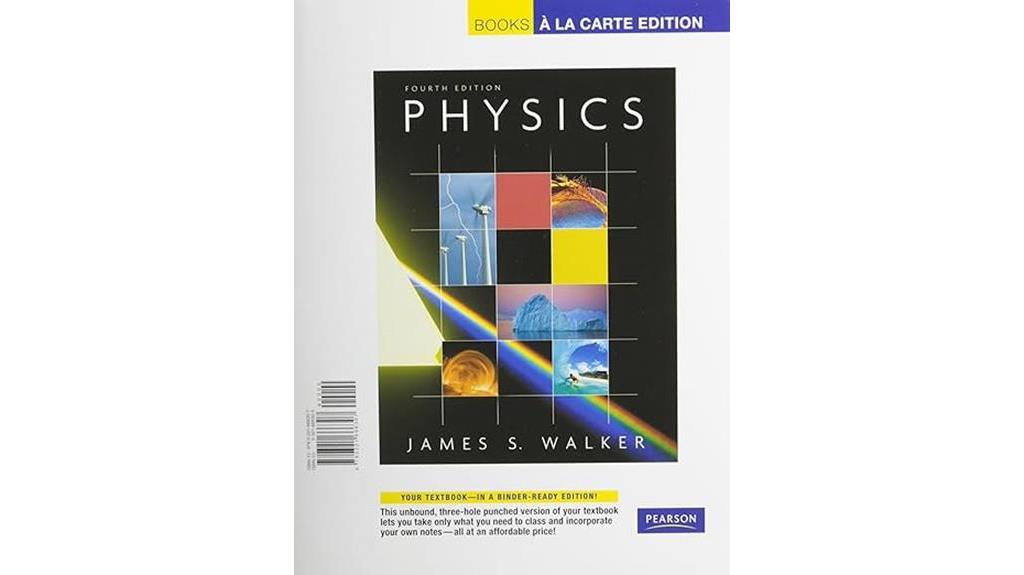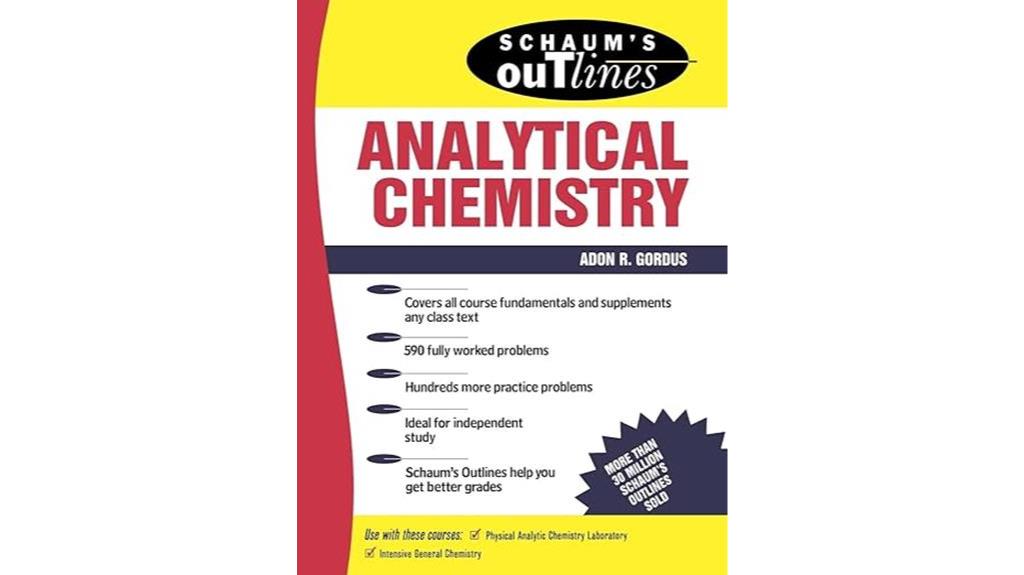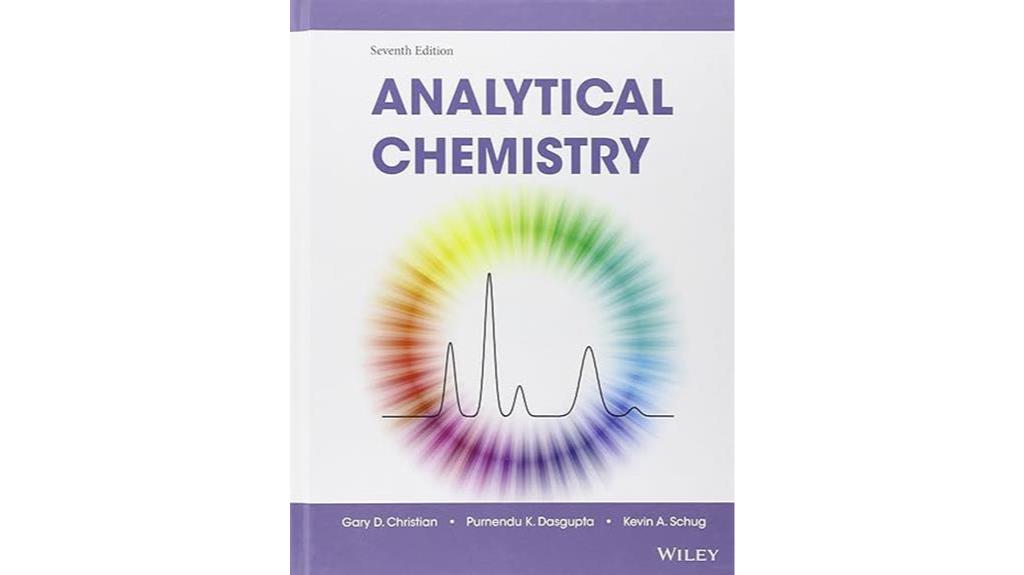As someone passionate about analytical chemistry, I highly recommend "Fundamentals of Analytical Chemistry" for its clear explanations. "Schaums Outline of Analytical Chemistry" is also fantastic with abundant examples. "Analytical Chemistry" offers modern approaches. These books cover essential topics with valuable insights. By exploring these resources further, you can gain a deeper understanding of analytical chemistry and enhance your skills.
Key Takeaways
- Consider relevance, clarity, and practicality when selecting analytical chemistry books.
- Prioritize modern approaches, clear explanations, and practical applications.
- Evaluate alignment with learning goals, expertise level, and required depth.
- Check reviews and recommendations from professionals and educators.
- Look for resources with relevant examples, exercises, and up-to-date information.
Fundamentals of Analytical Chemistry

For chemistry enthusiasts seeking a thorough understanding of the fundamentals of analytical chemistry, these books offer detailed explanations and practical exercises to enhance your knowledge and skills.
The tough nature of the course is no match for the excellent content provided. Despite minor discrepancies in chapter order between hardback and paperback versions, the text is clear, with beneficial exercises and essential highlights.
Especially remarkable are the explanations on kinetics and separations in Part VI, proving useful for readers. Advanced information on analytical chemistry is included, along with a solid review of analytical techniques.
While not the best for teaching concepts, the books excel in providing numerous worked-out examples and practice problems, making it a valuable resource for both students and experienced chemists alike.
Best For: Students and experienced chemists looking for a comprehensive resource on analytical chemistry with a focus on practical exercises and worked-out examples.
Pros:
- Clear text with good exercises and important highlights.
- Useful explanations on kinetics and separations in Part VI.
- Contains advanced information and a solid review of analytical techniques.
Cons:
- Minor discrepancies in chapter order between hardback and paperback copies.
- Some content not clear in the black and white edition.
- Not ideal for teaching concepts, but beneficial for practice problems.
Schaums Outline of Analytical Chemistry

Ideal for individuals who've a strong foundation in analytical chemistry and are seeking a thorough review with ample practice exercises, the 'Schaums Outline of Analytical Chemistry' is a valuable resource for enhancing understanding and mastering essential topics in the field.
This book explores topics such as electrochemistry, pH, precipitation, and potentiometry, providing clear explanations and numerous examples to aid in comprehension. With a focus on practice questions, it offers a chance to reinforce learning and test your knowledge effectively.
While some critics mention that spending extensive time with this book may not be necessary and prefer undergraduate general chemistry texts for review, many find it to be a helpful companion for those who've already taken analytical courses. Additionally, it serves as a valuable reference for both teachers and students, covering important concepts in analytical chemistry.
Best For: Individuals with a strong foundation in analytical chemistry seeking a comprehensive review with ample practice exercises.
Pros:
- Clear explanations of electrochemistry, pH, precipitation, and potentiometry.
- Abundance of examples and exercises for mastering topics.
- Valuable reference for teachers and students in analytical chemistry.
Cons:
- Some may find spending extensive time with the book unnecessary.
- Criticisms about the naming of variables in equations.
- Age of the edition from the 80s may be a drawback for some users.
Analytical Chemistry

The best choice for passionate chemistry enthusiasts seeking a thorough and detailed guide on analytical chemistry is the Analytical Chemistry book recommended in the article. With positive reviews highlighting its modern approaches and clear explanations, this book is considered essential for every chemist's library.
It's suitable for both undergraduate study and advanced readers, offering an in-depth look into the world of analytical chemistry. While some critics find it challenging to read and mention missing information, overall, it's praised as a must-have resource for any chemistry student.
Additionally, comments on the helpful side notes in the book add to its value as a teaching aid.
Best For: Students and professionals in the field of chemistry seeking a comprehensive and detailed resource on analytical chemistry.
Pros:
- Modern approaches and clear explanations make it a top choice for contemporary analytical chemistry studies.
- Essential addition to every chemist's library, suitable for both undergraduate and advanced readers.
- Valuable teaching aid covering essential knowledge for analytical chemists.
Cons:
- Some readers find it challenging to read and mention missing information.
- Complaints about language, errors in the solution manual, and overly complicated examples.
- Suggestions to explore other textbooks due to complexity and lack of simplicity in explanations.
Factors to Consider When Choosing Analytic Chemistry
When selecting analytic chemistry resources, I always consider key factors such as relevance to my field, level of detail provided, and the credibility of the author. These selection criteria are essential in making informed decisions about which books to invest in for my studies.
Essential aspects like practical examples, clear explanations, and thorough coverage are also important elements to keep in mind.
Key Considerations
Considering factors when selecting analytic chemistry resources is essential for ensuring alignment with my learning goals and expertise level. It's important to assess the depth of coverage in the materials to match my objectives and knowledge level effectively.
Clear explanations, relevant examples, and practical exercises are key elements to look for in books or guides to enhance comprehension. Checking the publication date is necessary to guarantee the information is up-to-date and reflects current practices in the field.
Evaluating the suitability of the resource for my specific needs, whether for academic study, professional development, or reference, is also significant. Additionally, taking into account any mixed or negative reviews can provide insights into potential drawbacks or limitations in the analytic chemistry material being considered.
Selection Criteria
As I explore the domain of selecting analytic chemistry resources, my primary focus lies on evaluating essential selection criteria to guarantee ideal alignment with my learning goals and expertise level.
To begin with, I consider the level of detail and depth of coverage offered in the resource to make certain it matches my learning objectives. Clear explanations, examples, and practice problems are vital factors that aid in grasping complex analytical concepts effectively.
Additionally, evaluating the relevance of the content to my specific course or research needs is essential to maximize the utility of the resource. I also look for supplementary materials like solution manuals or online resources that can further enhance my learning experience.
Lastly, I prioritize resources recommended by educators or professionals in the field for their accuracy and effectiveness. By considering these selection criteria, I can ensure that the analytic chemistry book I choose will best support my learning journey.
Important Factors
To choose the most suitable analytic chemistry book, one should carefully assess the reputation and expertise of the author or authors. Authors with a strong background and experience in the field are more likely to provide accurate and valuable information. Additionally, when selecting a book, it's important to look for ones that cover a wide range of analytical techniques and methods. This guarantees a thorough understanding of different approaches used in analytic chemistry.
Furthermore, checking the publication date of the book is vital to make sure that the content is up-to-date with the latest advancements in the field. Analytic chemistry is a rapidly evolving discipline, and staying current is essential for a well-rounded education. Another critical factor to take into account is the level of detail and clarity in explanations provided in the book. Clear and concise explanations help in grasping complex analytical concepts more effectively.
Lastly, reviewing feedback and reviews from other readers or professionals can offer valuable insights into the book's effectiveness and relevance. This external perspective can help in making an informed decision when selecting an analytic chemistry book.
Decision-Making Elements
When selecting an analytic chemistry book, one must carefully assess the level of detail required for their specific study or work in the field. It's important to evaluate whether the book aligns with the depth of knowledge needed for your academic or professional endeavors.
Additionally, considering the focus on modern approaches and techniques is essential. Analytic chemistry is a rapidly evolving field, so ensuring that the book covers contemporary methods is crucial for staying current.
Furthermore, look for clear explanations and thorough coverage of essential topics. A good analytic chemistry book should provide in-depth explanations that are easy to understand, along with extensive coverage of key concepts. It's also important to check if the material is suitable for your academic level, whether undergraduate or advanced study in analytical chemistry.
Lastly, assess the balance between theoretical concepts and practical applications in the book. A well-rounded resource should offer a blend of theoretical foundations and real-world applications to enhance your understanding and skillset in analytic chemistry.
Essential Aspects
Considering the essential aspects when selecting an analytic chemistry book is vital for choosing the most suitable resource for your academic or professional needs.
Firstly, it's important to evaluate if the book aligns with the topics you require for your studies or research.
Next, evaluate the level of detail and complexity to make sure it matches your current knowledge and learning objectives.
Additionally, the clarity and effectiveness of the explanations provided in the book play a significant role in aiding your understanding of complex concepts.
It's also beneficial to check for complementary resources such as solution manuals or online tools that can enhance your learning experience and provide additional support.
Lastly, appraising the relevance and modernity of the content is essential to ensure that the book meets the standards of current analytical chemistry practices, keeping you up-to-date with the latest advancements in the field.
Critical Evaluation Points
When selecting analytical chemistry books, emphasizing the depth of coverage and clarity of explanations is important for a thorough understanding of complex concepts. It's essential to take into account the level of detail provided in the textbooks to make sure they meet your academic requirements.
Look for books that offer clear explanations and relevant examples to aid in grasping intricate analytical chemistry principles effectively. Additionally, evaluating the textbook's relevance to your specific course or research focus is crucial to maximize its utility and applicability.
Checking for supplementary materials or resources accompanying the textbook can further enhance your learning experience and comprehension of the subject matter. Finally, seeking reviews and recommendations from peers, professors, and professionals in the field can provide valuable insights into the quality and suitability of the analytical chemistry textbook you're considering.
Choosing Wisely
When selecting analytic chemistry books, it's important to prioritize clarity, relevance, and practicality to ensure the best learning outcomes.
To begin with, consider the level of detail required for your specific analytical chemistry needs. Whether you're looking for an in-depth guide or a focused resource, matching the depth of coverage to your requirements is essential.
Additionally, evaluating the clarity and organization of the content is vital for easy comprehension and effective learning. Aligning the book with your course requirements or career goals maximizes its relevance and applicability to your studies or professional development.
Moreover, seeking reviews and recommendations from experienced chemists or educators can provide valuable insights to guide your selection process. Look for books that offer practical examples, exercises, and real-world applications to enhance your understanding and skills in analytical chemistry.
Frequently Asked Questions
Are There Any Online Resources to Complement These Books?
Yes, there are many online resources available to complement these books. Websites like Khan Academy, Coursera, and YouTube channels such as CrashCourse Chemistry offer valuable supplementary materials to enhance your understanding.
How Can I Apply the Concepts in Real-World Scenarios?
I apply chemistry concepts in real-world scenarios through experimentation, data analysis, and problem-solving. By connecting theory to practical applications, I gain a deeper understanding of how chemistry influences everyday life and scientific advancements.
Are There Any Interactive Exercises or Quizzes Included?
Yes, interactive exercises and quizzes are included in most books, providing hands-on practice and reinforcing key concepts. They are great tools for self-assessment and applying theoretical knowledge to practical situations.
Can These Books Help With Advanced Analytical Techniques?
Certainly, these books explore advanced analytical techniques in great detail. For example, a case study in one book showcased how the use of mass spectrometry unveiled complex molecular structures, contributing to innovative research and issue resolution.
Are There Any Recommended Supplementary Readings for Further Exploration?
I'd suggest looking into texts on specialized topics like mass spectrometry, chromatography, and spectroscopy. These can deepen your understanding and provide additional insights into advanced analytical techniques beyond the basics covered in general chemistry books.
Conclusion
After diving into these top analytic chemistry books, I feel like a scientist armed with a powerful microscope, ready to unravel the mysteries of molecules and compounds.
Like a detective following a trail of clues, each page led me closer to understanding the intricate world of chemical analysis.
With these books as my guide, I'm equipped to explore the fascinating domain of analytical chemistry with confidence and curiosity.
Principles Of Analytical Chemistry
Author by : Miguel Valcarcel
Languange Used : en
Release Date : 2012-12-06
Publisher by : Springer Science & Business Media
ISBN :
Description : Principles of Analytical Chemistry gives readers a taste of what the field is all about. Using keywords of modern analytical chemistry, it constructs an overview of the discipline, accessible to readers pursuing different scientific and technical studies. In addition to the extremely easy-to-understand presentation, practical exercises, questions, and lessons expound a large number of examples....
Calculations In Chemistry
Author by : John Olusina Obimakinde
Languange Used : en
Release Date : 2014-06-30
Publisher by :
ISBN :
Description : Calculations in Chemistry is intended to help students overcome the challenges associated with solving the numerical problems in chemistry. Chemistry is a numerical science which cannot be fully appreciated without adequate numerical skills. In fact, the lack of problem-solving skills has been recognised as one of the major reasons for the poor performance recorded in the subject over the years. Budgetary and size constraints often translate to lack of space for solving enough sample problems in core textbooks and most problems are presented in a difficult manner that douses enthusiasm for learning....
Analytical Chemistry
Author by : G.L. David
Languange Used : en
Release Date : 2001
Publisher by : Universities Press
ISBN :
Description : This book deals with the principle and applications of analytical chemistry, and is useful for B.Sc. Chemistry students and those working in analytical research laboratories of drug, pesticide and other chemical industries....
Colour Chemistry
Author by : Robert Christie
Languange Used : en
Release Date : 2007-10-31
Publisher by : Royal Society of Chemistry
ISBN :
Description : This book provides an up-to-date insight into the chemistry behind the colour of the dyes and pigments that make our world so colourful. The impressive breadth of coverage starts with a dip into the history of colour science. Colour Chemistry then goes on to look at the structure and synthesis of the various dyes and pigments, along with their applications in the traditional areas of textiles, coatings and plastics, and also the ever-expanding range of "high-tech" applications. Also discussed are some of the environmental issues associated with the manufacture and use of colour. The broad and balanced coverage presented in this book makes it ideal for students and graduates. In addition, many specialists in industry or academia will also benefit from the overview of the subject that is provided....
Bulletin Of The Atomic Scientists
Author by :
Languange Used : en
Release Date : 1961-05
Publisher by :
ISBN :
Description : The Bulletin of the Atomic Scientists is the premier public resource on scientific and technological developments that impact global security. Founded by Manhattan Project Scientists, the Bulletin's iconic "Doomsday Clock" stimulates solutions for a safer world....
Mathematics For Quantum Chemistry
Author by : Jay Martin Anderson
Languange Used : en
Release Date : 2012-12-13
Publisher by : Courier Corporation
ISBN :
Description : Introduction to problems of molecular structure and motion covers calculus of orthogonal functions, algebra of vector spaces, and Lagrangian and Hamiltonian formulation of classical mechanics. Answers to problems. 1966 edition....
Inorganic And Analytical Chemistry
Author by : Henry A. Bent
Languange Used : en
Release Date : 1970
Publisher by :
ISBN :
Description : ...